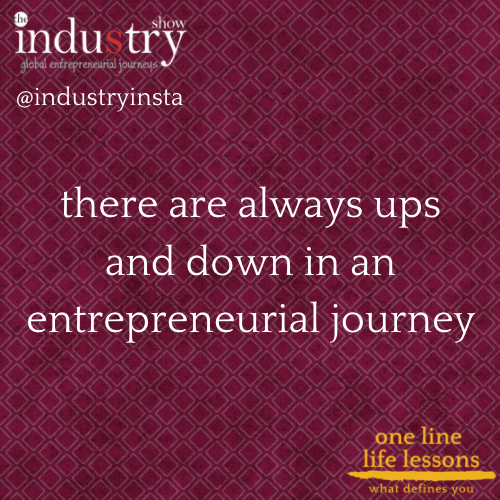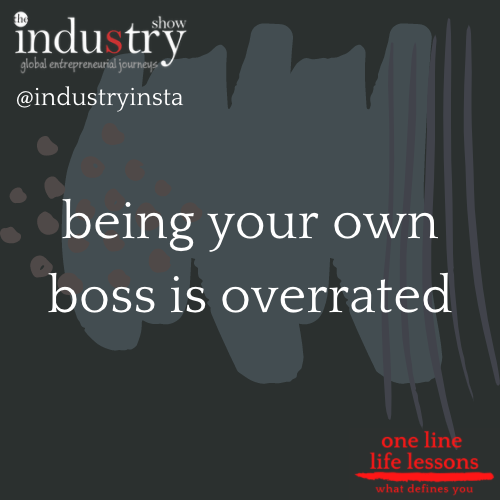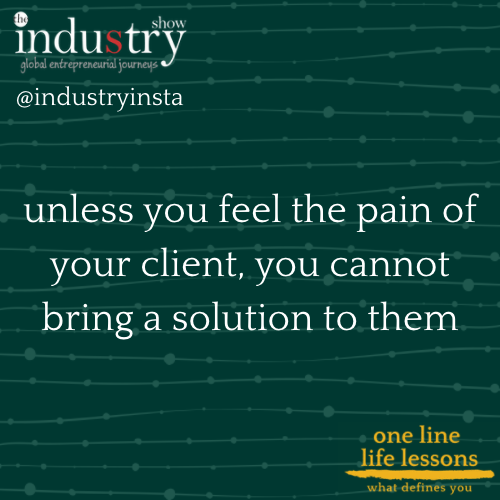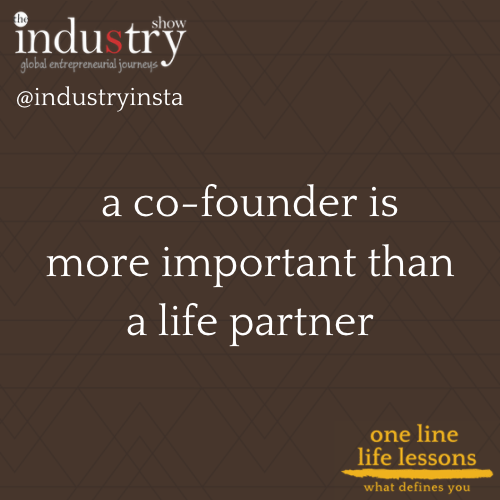May 7, 2022
Aparna Basker
Aparna Basker is the founder of BanyanWay – a platform for Indian singles living in the USA to get connected. She is a seasoned IT professional with 10+ years of experience building healthcare software. Aparna is a passionate travel planner, loves listening to Ilayaraja’s music in her spare time.
One Line Life Lessons from Aparna





Episode Highlights
- (0:00:00) – Nitin Bajaj welcomes Aparna Bhaskar to the show
- (0:01:02) – Let’s play a quick game about a few themes that impact us
- (0:02:24) – BanyanWay is a platform for connecting singles of indian origin
- (0:07:10) – Every community driven initiative comes with its own set of challenges
- (0:09:31) – You’re communicating to two completely different generations and still do this
- (0:11:45) – Now, as you look back in the rear view mirror through your professional career or your entrepreneurial career
- (0:13:31) – Being your own boss comes at a high price, but it is worth it
- (0:16:26) – Aparna shares some life lessons with us about entrepreneurship and matchmaking
Show Transcript
Transcript - Full Episode
Nitin Bajaj: (0:00:00) – Welcome to the industry show. I’m your host, Nitin Bajaj. And joining me today is Aparna Basker. Aparna, welcome on the show.
Aparna Basker: (0:00:08) – Thank you, Nitin, for having me on your show.
Nitin Bajaj: (0:00:12) – Thank you for being here. Let’s start with, who is Aparna?
Aparna Basker: (0:00:17) – Well, I am an immigrant parent. I moved to the US from Chennai, India, 1999. So it’s been a while since I have been in the US. I have been married, happily married, for 25 years. And I am a it professional. I have written software for healthcare and for Fintech. And currently I’m a founder of BanyanWay. And BanyanWay is a platform that helps singles find their potential partner. And I just love what I do.
Nitin Bajaj: (0:00:58) – That’s awesome. And would love to hear more about Banyan Bay. Before we do that, let’s play a quick game. Underrated. Overrated. About a few themes that impact us. And when you’re ready, we’ll get started.
Aparna Basker: (0:01:13) – Okay. We can get started.
Nitin Bajaj: (0:01:15) – All right, let’s do this. So the first thing is stock market prices.
Aparna Basker: (0:01:22) – I think it’s overrated.
Nitin Bajaj: (0:01:24) – Okay. Real estate prices.
Aparna Basker: (0:01:29) – Underrated.
Nitin Bajaj: (0:01:31) – Okay.
Aparna Basker: (0:01:31) – Crypto, overrated.
Nitin Bajaj: (0:01:36) – What about the meta verse?
Aparna Basker: (0:01:39) – Same there. Overrated.
Nitin Bajaj: (0:01:41) – Startup valuations?
Aparna Basker: (0:01:45) – Definitely. I feel it’s overrated.
Nitin Bajaj: (0:01:48) – What about cash?
Aparna Basker: (0:01:51) – Always overrated.
Nitin Bajaj: (0:01:52) – Okay. The great resignation.
Aparna Basker: (0:01:58) – I think it’s underrated. Or it can be neutral.
Nitin Bajaj: (0:02:01) – Okay. Stakeholder capitalism?
Aparna Basker: (0:02:07) – Overrated.
Nitin Bajaj: (0:02:09) – And inflation?
Aparna Basker: (0:02:12) – Underrated.
Nitin Bajaj: (0:02:14) – And then the last one is nfts.
Aparna Basker: (0:02:19) – Overrated.
Nitin Bajaj: (0:02:21) – All right, well, that was fun. Thanks for playing along. Now let’s bring it back to something closer to you. Tell us about BanyanWay. What is the vision? What is the mission? And then also if you can, give us a size and scale of what the operations look like today.
Aparna Basker: (0:02:38) – Okay. BanyanWay is a platform for connecting singles of indian origin living in the US. We just want to help singles find their potential partner, find the love of their life. And in terms of. We think that there is a cultural aspect that is missing once we moved over to the US. So we are trying to bring it back in and try to help find someone of similar cultural background. We believe in connecting people. That’s what we do.
Nitin Bajaj: (0:03:15) – What’s the size and scale? How many geographies within the US are you operating in? And when you look at this, to me, this is more of a marketplace. So are both sides of the equation based in the US?
Aparna Basker: (0:03:31) – That’s right. So we are focused on people living in the US, whether it is parents or singles. Singles, if they want to take help from their parents or elder sibling or relative they can be involved in the process. Otherwise, singles can take control and be involved in the process. So we are primarily focused on singles living in the US, but their parents can be living anywhere in the world. We have clients from Dubai and UK and Canada, also parents living elsewhere. But singles need to be living in the US, at least for now. And in terms of geographies, it’s a virtual platform. So we cater to people across us, but we try to market, keep changing the marketing strategies and focus on people. Where there is a concentrated population of Indians, like Bay Area or tri state area, or Chicago or Detroit or Dallas.
Nitin Bajaj: (0:04:29) – And so on, makes sense now, in this virtual app based world, where does this fit in? In other words, why do this? And why do this now?
Aparna Basker: (0:04:44) – As I said, I’m an immigrant parent and my children grew up here. When I started this, they were still in the first year of college and high school. So I was not thinking about my children per se, but I knew that I will face this day. The main thing is, I feel that when we moved from India, we lost all the network that we had back in. Had. When I got married, my mom and my parents had, my grandparents were also involved in the process. They would nudge my dad to do this and do that and go and find a match. And all my aunts and uncles were part of the process. They would find a match and the whole community comes together when there is a match finding problem. And it was very traditional. But what I feel is that network is completely lost. As an immigrant parent, I don’t have any guidance from my parent because they don’t know how things work here. So I wanted to recreate that network and build that community back here, because we move with the same set of people, same circle, same circle of friends. And I wanted to build a larger community where people can come together and help each other and also find help among circles. So that was the goal of finding Banyan Bay. And this is applicable to singles also, because singles who are grown, born and brought up here, they have lot of indian cultural aspects that they are exposed to, whether it’s the food that they eat or the movies that they watch or the language that they speak. They are soaked in indianism because we are fearful of losing all our culture and we try to expose them to indian culture. So ideally, they would like to find someone who has had similar cultural experience growing up. And that is where the challenges, if they have found someone when they are in school or high school or college, that’s great. But once they start working, the opportunity to meet new set of people just goes down. And there are so many platform dating platforms. However, the number of indian singles on these platforms is just scattered. They are scattered in so many platforms, so we don’t have too many apps or too many platforms that bring them all together. So we try to do that on Banyan day.
Nitin Bajaj: (0:07:09) – Love the mission. Now, every business, every community driven initiative we take on comes with its own set of challenges. What would you say is the biggest challenge you’re facing today?
Aparna Basker: (0:07:27) – Every day, the challenges vary, right. So when I started challenge was to figure out whether we had a market, whether we could validate. We had a hypothesis, but we had to see whether people will be willing to take our service. What is it that we want to do? Are we giving the right solution? Today we have walked the walk, and today we feel that we have validated that there is a market, there is a need for it, and people want a solution. And people like our solution. And today our challenges are different. We have not gone out and raised any external funding. It’s all homegrown. So we have a struggle of scaling and trying to become big. Customers are pulling information from us, asking for more things, more services. But we can either run the business or go and focus on raising funds. But it’s hard to do both. So that is one of our challenges. And second thing is always marketing. Right? So every day the marketing is changing. The way people market, the way people communicate or connect with their clients is changing day by day. So how do we get the message? Should we use. There are umpteen platforms that every day there are new platforms coming up, like Snapchat and TikTok, too. Should we be in all of them or some of them, or which ones should we. So marketing is a huge challenge for us.
Nitin Bajaj: (0:08:58) – Very well put across. And also, I think with this demographic, you’re catering to two very different generations, the parents versus the singles themselves, who typically tend to be on different platforms and to go to them or to attract them and to bring them on, those are completely different strategies, I would imagine.
Aparna Basker: (0:09:20) – Absolutely. It’s like running two companies, right? But we have capacity to run one or less than one. So that is a struggle.
Nitin Bajaj: (0:09:31) – Now, on the flip side of challenges or opportunities, what the most exciting one that you’re targeting that gets you up and take on these challenges and take on the task of communicating to two completely different generations and still do this?
Aparna Basker: (0:09:55) – I think from day one, it has always been the opportunity to make a difference in someone’s life, even a small difference in someone’s life. Right. So when we talk to the parents or when we talk to the singles, we feel the pain and we feel the need for a service like this. And every day, whatever we do is inching towards that and helping some, and to see any success, even to mutually connect through people, we feel excited about it. And when people send a wedding invitation and send a silk sari for a wedding invitation, ask us to fly over to their wedding, we feel that this is totally worth it.
Nitin Bajaj: (0:10:42) – Given how long and how big the indian weddings are. That almost scares me that the number of people you’re putting through this. And the successful, the more your success, the bigger the commitment of going for these weddings. So that scares me.
Aparna Basker: (0:10:59) – Yeah, it’s exciting, but it is huge, too. Huge opportunity, too. And when we say success, just connecting people itself is a big challenge in this day and age. And they take their own time to take a decision. So by the time they decide that they want to, who wants to move to which location and who wants to give up their job or give up their career or figure out how to work all these things out, it takes years together to make such decisions. So it’s just a challenging field.
Nitin Bajaj: (0:11:35) – So true. Hopefully, in this post pandemic world, when most of the work has become work from anywhere, at least some of those challenges have reduced. Now, as you look back in the rear view mirror through your professional career or your entrepreneurial career, have there been moments of things not working out as you expected or things that just failed? I tend to look back at those as lessons learned. What did I take away from this? What’s the one that stands out for you?
Aparna Basker: (0:12:12) – I don’t think there is any entrepreneur journey without any of these ups and downs. So we have had many. But one thing I realized all along the way is no matter what happens, the people with whom you work with, they are the ones who are helping you tread through this. Right. So you cannot be a sole journey. You cannot do this all alone. So I have a very strong partner. My partner is Greg Watson. So we walk the walk, and when we have tough times, we are there for each other. When we have happy times, we are there for each other. And my team, the whole team is like that. When I started BanyanWay, I reached out to people I know of to start to form a team, and they are the foundational building blocks. So they have been with me and they work tirelessly and I don’t have to tell anything. So that team and your co founder are the two important people, basically are the most important thing you need to have in order to just even go through this journey.
Nitin Bajaj: (0:13:29) – So true. Now let’s switch gears a little bit and come to my favorite part of the show, the one line life lessons. These are lessons, not quotes. But then they’re also simple and profound. And I find them to be often life changing. Would love to hear some of your one line life lessons.
Aparna Basker: (0:13:52) – One thing I always think, wonder why I started BanyanWay. Sometimes I’m like, what did I sign up for? But being your own boss is little overrated and it comes at a very high price. But at the end of it, it is worth it. But you have to realize before you get into that mode, people think that I don’t want to work for someone. I want to be my own boss. I want to start my own business. That’s all great, but with that comes a huge responsibility on various areas. Right. So you have to constantly keep gives you an opportunity to better yourself every day because you have a team that you need to guide and you are accountable in so many areas. All that is there. But at the end of it, if you have a pain point that you really feel that you can solve or make a difference, it is worth it. But just being a boss is not as cool as it sounds. That is one thing. Second thing is I feel that unless you feel the pain of your clients, you cannot bring a solution that works for them. So you need to really understand when a parent or a single calls and they’re frustrated about a profile that you sent or a match that they see or what they are not seeing, it does not mean that you don’t have what they need. It’s just that they have been through this process since for ten years. Some of them have been through this process for 1520 years because they started when they are 22 and they have not found a match when they are 35 or 38. So imagine the frustration that they can have. And you have to be empathetic, otherwise this will just not work. True.
Nitin Bajaj: (0:15:40) – You have to be in their shoes to feel the pain they feel. Yeah, I never thought of it that way. I mean, somebody’s going through it for 1015 years that can almost feel like there is something lacking in them when that may not be the case.
Aparna Basker: (0:15:57) – Absolutely. And the social pressures are also there. Right. The parents keep bringing up this topic and no matter what they achieve in their personal lives, they are made to feel that personal in their professional life, they are made to feel that they are not successful in their personal life. And that makes it extremely frustrating. So we keep seeing that oftentimes.
Nitin Bajaj: (0:16:25) – True. Any other life lessons you would like to share with us?
Aparna Basker: (0:16:29) – I think those are the two main that I have felt and learned and keep thinking every day. Apart from that, if you want to build a company, make sure that you give enough importance, more importance than you would give for finding your life partner. Your co founder has to be, you need to be more compatible with your co founder than with your spouse because it’s a journey. It’s a very tough journey and you have to be there for each other. You have to compliment each other and thick and thin of times, you should be there for each other.
Nitin Bajaj: (0:17:07) – That’s a very valid point. And in comparison to and coming from you, who’s essentially matchmaking and combining life partners, that’s a key point of differentiation, that the journey of life and the journey of entrepreneurship are very similar. But 1 may take more from you than the other. So that compatibility and understanding who you’re jumping in with is extremely important.
Aparna Basker: (0:17:38) – Absolutely.
Nitin Bajaj: (0:17:40) – Aparna, thank you so much for sharing your life lessons with us and also for being here and sharing your journey. We really appreciate it. Congratulations for what you have launched and we wish you continued success.
Aparna Basker: (0:17:53) – Thank you so much. And thank you for having me. And thank you for doing this because we love stories and we learn from all these stories. So one of my favorite things to do is when I go for a walk or something, I just listen to your YouTube channel and keep walking. So life lessons learn.
Nitin Bajaj: (0:18:13) – Thank you so much. We’re really humbled. We really appreciate this opportunity to talk about these journeys that people go through, which, like you said, is a lot of ups and downs. It’s never a straight line, and it’s really inspiring for me to listen to these journeys and to learn from people that have walked the path that I someday hope to walk. So thank you again.
Aparna Basker: (0:18:40) – Thank you.
Nitin Bajaj: (0:18:42) – Thanks, Aparna.



